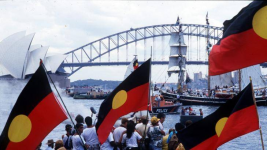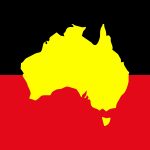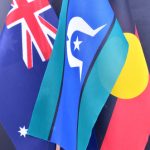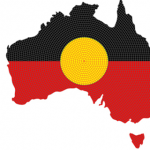Treaty Can No Longer Be Denied

The Justice Through Treaty rally saw thousands of people march through Sydney streets on January 26 calling on Australian governments to enter into meaningful treaty negotiations with the various First Nations peoples throughout the continent.
While on the three days prior to the march, Aboriginal and Torres Strait Islander peoples met for a series of Treaty Talk Workshops that were held at the National Centre of Indigenous Excellence to discuss the renewed push for treaty.
Providing dignity to all
Australia is the only Commonwealth nation not to have entered into a treaty with First Nations peoples. Indeed, nations like Canada and New Zealand, along with the United States, entered into treaties with Indigenous nations long ago.
And while these negotiated agreements might have heavily favoured European occupiers, the documents also recognised the sovereignty of First Peoples, along with providing an avenue for legal redress, and establishing a basis for coexistence.
Successive Australian governments have refused to recognise Aboriginal and Torres Strait Islander sovereignty. Indeed, under the British Crown, countless atrocities have been perpetrated upon these peoples, and then these injustices have been flat out denied.
But, over recent days, these prominent calls for treaty are a sign that a faltering nation must begin to come to terms with its true history and move towards becoming a mature society.
A denial of existence
Deakin University Institute of Koorie Education lecturer Terry Mason spoke at the recent treaty workshops held in Sydney. The Awabakal man has long played a significant role in the conversation about treaty in this country.
“There’s a fundamental expression of racism and control in the structures in Australia that tend to make it awkward and difficult to talk rationally about treaty,” Mr Mason outlined. He also said that the resistance to treaty goes back much further than the current Turnbull government.
According to Mason, the reason why a treaty was never negotiated with First Nations peoples is due to the British occupiers claiming that they acquired the continent because it was terra nullius: the concept that the land had no owners.
Terra nullius was overturned by the Australian High Court in its 1992 Mabo versus Queensland (No 2) ruling. However, Mason believes it’s this legal fiction that’s led to the idea that Aboriginal people don’t deserve a share in resources, or self-determination and recognition of their sovereignty.
A history of false starts
Mr Mason recalls that discussion of treaty entered the modern political arena in 1979, when the Fraser government set up a national consultation that reported back to the federal government recommending that a treaty be considered.
In 1988, then prime minister Bob Hawke was presented with a petition, known as the Barunga statement, which called for treaty negotiations to begin. The PM responded with an assurance that one would be negotiated by 1990, but that promise was never realised.
Then John Howard entered the political arena. And in 2000, he rejected the idea of a treaty stating that a nation “does not make a treaty with itself.” And under Howard’s watch, Australia was also one of only a few nations not to ratify the UN Indigenous rights treaty in 2007.
Along with recognising First Peoples sovereignty, and bringing about meaningful structural change, a treaty could also enshrine the rights that are set out in the United Nations Declaration on the Rights of Indigenous Peoples.
A robust treaty framework
“Modern treaties are between sovereign peoples. And they need to take into account people’s inalienable right to their sovereignty,” Mason told Sydney Criminal Lawyers®. He outlined that rights pertaining to culture, intellectual property, custodianship and stewardship would also be entailed.
Mr Mason explained that there would have to be a series of different treaties with the various First Nations of this continent. These would come to terms with the modern Indigenous experience, which is “diverse as Aboriginal people are around the country.”
The terms of treaties in those parts of the country where Indigenous custodianship and original law are still practiced would be vastly different from other regions, where cultural and intellectual rights might dominate negotiations, as custodian rights may no longer be accessible to local people.
And there would also have to be an “overarching framework” for all treaties that recognises that the sovereignty of Aboriginal and Torres Strait Islander peoples has never been ceded, and that First Nations people’s rights must be considered within the structures of the nation.
Reparations are overdue
The negotiation process will have to be taken slowly and very carefully, Mason said. And adequate funding will have to be allocated. He pointed to a situation in the Canadian province of British Columbia where a treaty commission was set up at the First Nations Congress in 1992.
The government provided the various First Nations with a $250 million loan to enter into the treaty process. The nations were to relinquish specific lands, and compensation and treaty rights were to be established.
And as Mr Mason makes clear this implied that “the ongoing benefits to the native peoples would be such that a $250 million loan would be able to be repaid without causing great harm and reducing any benefits of the treaty to the original peoples.”
A maturing nation coming to terms
NSW opposition leader Luke Foley recently announced that an elected state Labor government would enter into treaty negotiations with local nations. This follows the NT government committing to such a process, and the Victorian and SA governments already having entered into negotiations.
However, Victorian Greens MP Lidia Thorpe said the Victorian state treaty process is highly flawed. The Gunnai-Gunditjmara woman told us in December that the process is being run by an accounting firm and doesn’t allow for grassroots voices to be heard.
A meaningful treaty would provide “a far greater sense of certainty for everyone in the country,” Mason continued. It would move beyond the 1996 Wik Peoples v Queensland High Court precedent, which allows the rights of any other parties to override Indigenous rights in the case of a conflict.
And another solid benefit that robust modern treaties provide First Nations peoples is “the sense of identity and esteem.” Mason further outlined that for oncoming generations of Indigenous children this “builds strong relationships.”
“And Australia needs strong relationships,” he concluded.







